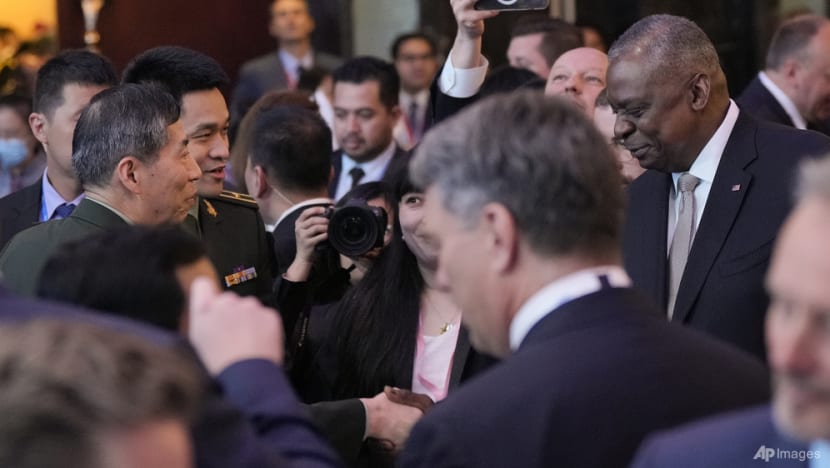‘Would you two please talk?’: Observers lament underwhelming US-China handshake at Shangri-La Dialogue

US Defense Secretary Lloyd Austin shakes hands with China Defence Minister Li Shangfu during the opening dinner for the 20th Shangri-La Dialogue in Singapore on Jun 2, 2023. (Photo: AP/Vincent Thian)
SINGAPORE: A lack of dialogue between US and Chinese defence chiefs at Asia’s top defence summit has disappointed observers hoping the two sides would take steps to thaw tensions.
At the Shangri-La Dialogue in Singapore over the weekend, US Defense Secretary Lloyd Austin and his Chinese counterpart Li Shangfu spoke briefly and shared a handshake, but stopped short of formal talks.
“It's quite strange that both countries are saying they want to avoid conflict, yet they are not sitting down to have a chat,” said University of New South Wales Canberra’s Emeritus Professor Carlyle Thayer.
Dr Oh Ei Sun, a senior fellow at think-tank Singapore Institute of International Affairs, said he had expected more significant discourse between the two defence heads, but speeches at the summit turned out to be underwhelming.
“We were looking forward to various sharp exchanges of words,” Dr Oh told CNA’s Asia First on Monday (Jun 5).
“But the speeches by these two were underwhelming. We didn’t see that trading of words that we saw in the previous Shangri-La Dialogues.”
WHY ARE THE US AND CHINA NOT TALKING?
All eyes at the Singapore summit – attended by more than 600 defence ministers and delegates from 40 nations – were on the possibility of talks between the US and China.
Washington had invited Mr Li to meet Mr Austin on the sidelines of the forum, but Beijing declined the offer, said the Pentagon.
Visits to Taiwan by US politicians, the ongoing trade conflict, and sanctions on Mr Li could be reasons for China’s refusal to meet the US at the event, said analysts.
Then-US House Speaker Nancy Pelosi travelled to Taipei last year while current Speaker Kevin McCarthy received Taiwan's President Tsai Ing-wen in California about two months ago. Both instances stoked the ire of China, which responded with military exercises around the island.
Tit-for-tat tariffs on goods that started when former president Donald Trump ramped up trade measures against China in 2018 mostly remain in place more than two years after President Joe Biden took office.
The ongoing semiconductor chip standoff and what China calls US suppression of Chinese companies such as Huawei and Tik Tok, have also soured economic relations between the countries.
On a more personal front, Mr Li was sanctioned by the US government in 2018 for acquiring Russian military equipment.
Noting that the snub could be down to a matter of pride, Prof Thayer asked: “How can someone who is being sanctioned by the US sit down with an opposite equal at a table?”
TENSIONS OVER ALLIANCES
In his first international public address since taking office in March, Chinese Minister of National Defence Li warned against establishing "NATO-like" military alliances in the Asia Pacific.
He did not name any country but appeared to be referring to the US, which is a member of the AUKUS alliance with Australia and Britain, as well as the Quad grouping, alongside Australia, India and Japan.
Beijing had accused the partnerships as being anti-China, saying they would stoke an arms race in the region.
Dr Oh said that while Washington envisions Asia-Pacific countries grouping together for a stronger security posture, Beijing sees the alliances as attempts to encircle and contain China.
“Therein lies the main difference between the US and China. The US and some of its allies see a stronger China potentially threatening the security of Asia and the Indo-Pacific,” he said.
“On the other hand, the Chinese see their own rise as inevitable. So there is potential for conflict and confrontations.”
Incidents in the past week involving what the US called "unnecessarily aggressive" actions by China with their fighter jets and ships in the South China Sea and the Taiwan Strait have continued to heighten tensions.
Related:
Prof Thayer said that while the US has been careful to adhere to international law and not violate China’s airspace in its surveillance activities, China sees them as reconnaissance that is too close for comfort.
“China's quite unequivocal that nations outside of the region, including the US and Australia, don't belong (in these areas). They are saying: ‘This is China's patch so mind your own business’.”
ASEAN CAN FACILITATE DIALOGUE
Regional countries can play a key role in facilitating communication between the bigger powers, experts said.
“One thing that everyone has agreed on at the Shangri-La Dialogue, and in ongoing conversations regarding global security, is to maintain open lines of communication,” Prof Thayer told CNA938’s Asia First.
“Yet that seems to be a challenge to achieve. As we saw, the Chinese refused to meet Mr Austin, and refused to go beyond a handshake.”
Regional pressure from nations that have relations with both superpowers, and which will be most affected by incidents in the South China Sea, could help initiate talks, Prof Thayer said. These include Australia and the Association of Southeast Asian Nations (ASEAN) member states.
Multiple initiatives and international summits undertaken by ASEAN can serve as venues for such dialogue, he added.
“(These forums) where ASEAN and Australian leaders are on the same page, can (tell US and China), ‘Hey, you guys, would you two please talk? Because your tensions are upsetting regional stability’.
“Both sides will have to see it's in their best interests (to have a constructive dialogue).”















